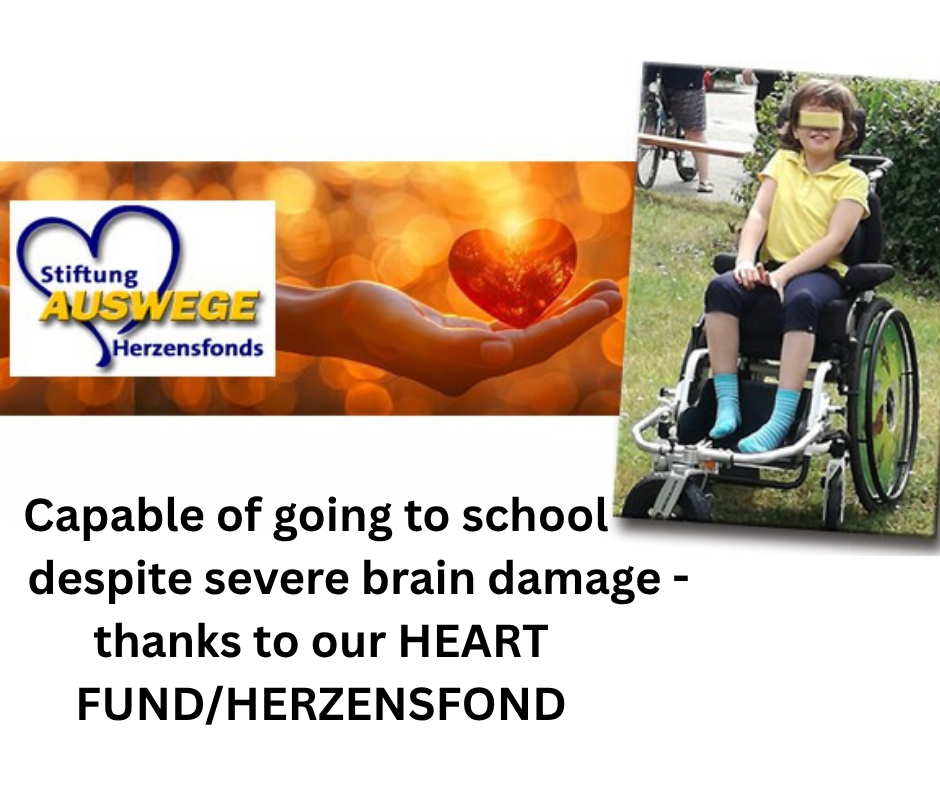Capable of going to school, despite severe brain damage – also thanks to our HERZENSFUND/HEARTFUND

What can be done when school medicine reaches its limits with a severely physically disabled child? Sometimes “alternative” therapies can help – as the moving story of little Nina* shows.
During her first three and a half years of life, Nina* is, by all appearances a perfectly healthy child – “un-conspicuous, milestones in line with the norm passed through chickenpox, scarlet fever, and 3-day fever”, as one doctor notes.
But then, during a family vacation in Italy, Nina suddenly develops severe diarrhea that won’t stop; she is constantly throwing up. What is wrong with her?
A pediatric clinic diagnoses “hemolytic uremic syndrome with acute renal failure, thrombocytopenia, and hemolysis”. (HUS, also known as “Gasser syndrome”, affects the small blood vessels; the disease destroys blood cells and damages kidney function. In thrombocytopenia, there is a lack of platelets in the blood; in haemolysis, red blood cells dissolve.
The girl, therefore, receives transfusions of a blood plasma concentrate. This leads to cerebral edema, which has fatal neurological consequences: Suddenly, Nina can no longer communicate. All spontaneous motor activity disappears. She only reacts to strong pain stimuli.
Since then, Nina has been severely physically disabled. Her movements are severely impaired. She is blind in her right eye. The bright, brave girl experiences her handicaps in full consciousness. Mentally, she seems brightly awake. A pediatrician who examined her at Erlangen University Hospital described her as “attentive, she obviously understands the conversation and also the requests made to her, and tries to comply with them. She speaks – indistinctly, but clearly understandable and always appropriate to the situation.” Nina attends school and participates in lessons; she dictates school and homework assignments.
After conventional medicine failed to help Nina for over two years, her parents stopped all conventional therapies. They now only rely on alternative medicine – at their own expense. “We tried a lot of things, some of which we still do today,” reports her mother, including Feldenkrais, Body Talk, kinesiology, and nutritional supplements. Kannegießer-Leitner psychomotor exercises, osteopathy, Anat Baniel – the “NeuroMovement” training program named after a Feldenkrais student – and various spiritual techniques. “Some of them have helped us move forward,” most notably several stays at the Family Hope Center for brain-injured children in Philadelphia.
At least Nina no longer needs medication. The dystonia has subsided, and muscle tension and body control have improved. She has learned to speak again. She can eat, chew, drink, and close her mouth independently again; she can sit upright again, crawl, and creep. Yes, her eyesight is beginning to return: “Nina can see some colors or very large things again,” confirms her mother.
Her mother hoped that Nina would make further physical progress by taking part in a therapy camp run by the AUSWEGE Foundation.
The HERZENSFONDS made it possible – and Nina’s physical and mental condition began to improve during the camp week. “She can drive her wheelchair more purposefully, which was impossible before,” her mother noted in a questionnaire at the end of the camp. “Facial features and uncontrolled movements have changed; they look a bit more natural. We can take many positive things and new ideas home with us.”
Shortly afterwards, Nina was able to transfer to a secondary school. The class teacher had even made a recommendation for grammar school.
What caused Nina’s misery is still unclear. Clinicians suspect that she may have been infected with EHEC, which is a particularly dangerous strain of the intestinal bacterium Escherichia coli, which can lead to permanent kidney damage; the girl was in contact with her father’s sister, who was being treated for suspected EHEC.
Delayed vaccination damage cannot be ruled out, but it is difficult to prove: Nina had received four quintuple vaccinations and a meningococcal vaccination. Only one in ten people infected with EHEC falls ill – due to immune deficiencies, to which numerous early vaccinations can contribute.
*: Pseudonym.
See also Hopeless? Not at all, and Cerebral palsy: a hopeless case?
Support “Ways Out Charity“! With your support, we can help and move forward.

